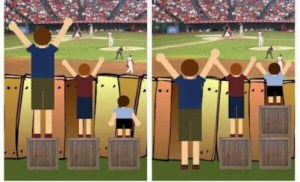It’s not hard to teach our children to be accepting of disabilities. Children are naturally eager and excited to learn new things. Like sponges, they quickly absorb new words, concepts and ideas. Children learn through imitation, and as they grow older, they form habits and opinions by repeating what they see and hear. Unfortunately, it is just as easy to teach children to be unwelcoming, wary or even fearful of people with disabilities.
When an adult walks past someone in a wheelchair, turning his head to the side to avoid making eye contact, the child next to him learns to avoid interactions with people in wheelchairs.
When a woman parks in the handicapped spot in a parking lot, she is teaching the children in her car that the needs of those who truly need such spots are insignificant.
When a woman deliberately avoids the checkout line at the grocery store that has a clerk or a bagger with disabilities, she teaches the children with her that this person’s work means less than someone else’s.
When a parent tells a teacher, in earshot of his own child, that he doesn’t want his son in class with “that” child; he teaches his son that a child with disabilities is less worthy of an education.
“Don’t worry that children never listen to you; worry that they are always watching you.” ~ Robert Fulghum
What if an adult looked the man using a wheelchair in the eye and said good morning?
 What if a woman explained to the children in her car that the reason they have to walk a little farther this morning is because there are certain spots saved for people who don’t walk as well as they can on their own (and that fair isn’t always equal)?
What if a woman explained to the children in her car that the reason they have to walk a little farther this morning is because there are certain spots saved for people who don’t walk as well as they can on their own (and that fair isn’t always equal)?
What if a woman deliberately chose a line at the grocery store for the clerk with a disability, quietly explaining, outside the store, that they continue to shop at this very store because of its inclusive employment policies?
What if a parent told a teacher, in earshot of his son, that his son has already mastered the math lesson and would be happy to help another child in the class catch up?
Lead by example. Be the person you hope your children will become. Teach your children that a wheelchair is just a ride. Demonstrate the value of treating others with kindness. Discuss the significance of choosing your words carefully and standing up for equality and the rights of others.
What if….
Lisa Friedman helped to build an inclusive synagogue school from the ground up and firmly believes that everyone has a right to learn & feel connected to his/her heritage. She consults with faith organizations to develop inclusive practices for staff, clergy, and families through dialogue, interactive workshops and awareness training. Lisa is also is a sought after speaker on a wide variety of topics for professionals, lay leaders, teachers, parents and teens. Lisa blogs at Jewish Special Needs Education: Removing the Stumbling Block on the issue of disabilities and inclusion and has been featured in such publications as The NY Jewish Week, ReformJudaism.org, and The Thinking Person’s Guide to Autism.

